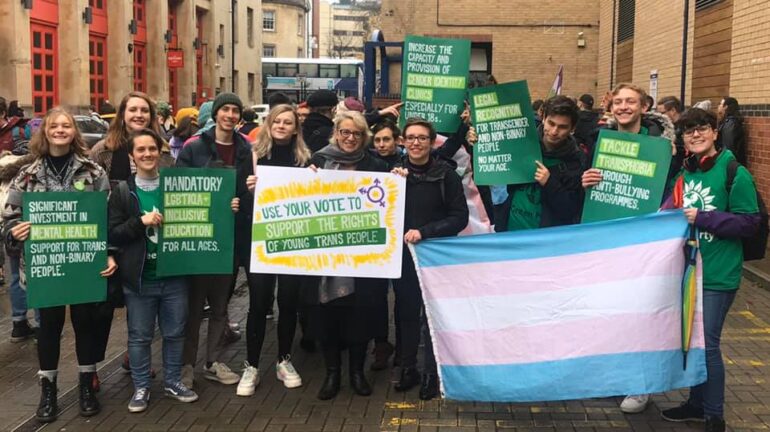Abortion Rights: Lies, Damned Lies, and Statistics
There’s a certain irony to promoting “non-directive counselling” as a means of reducing the abortion rate. But I’m starting to think that the coalition government doesn’t really understand irony.
The Department of Health announced today that they are planning to use NHS funds to support independent abortion counselling – provided by anti-abortion pressure groups – regardless of the outcome of a debate on the issue in the House of Commons. The Conservative MP Nadine Dorries has proposed an amendment to the Health and Social Care Bill, due to be debated on 6th September, which would ban any organisation that is involved in the provision of terminations from also providing counselling. Ms Dorries and her supporters claim that the counselling offered by abortion providers is biased, because they have a vested financial interest in the outcome (strangely enough, she seems unconcerned about the effects of letting private companies operate other parts of the NHS).
The Right to Know campaign claim to be defending a woman’s right to make an informed decision, but there is precious little truth behind these claims. The allegation that charities such as Marie Stopes International and the British Pregnancy Advisory Service encourage women to have abortions in order to increase their profits is deliberate misinformation – they’re charities, they aren’t making a profit. The counselling services they provide are already tightly regulated, and recent study has shown that their counselling is more balanced and of a higher standard than that which is offered in the independent crisis pregnancy centres which stand to take over from them.
The same study showed that some crisis pregnancy centres are routinely lying to the women who come to them for help. Women who approached these centres claiming to be in the early stages of pregnancy and considering abortion were given wildly inaccurate information about procedure and the potential risks. They were given literature which said that abortion could increase their risk of breast cancer, cause mental illness, or make them infertile, despite the fact that all of these claims have been disproved. These are not subjective arguments about the morality of abortion; they are actual lies about scientifically proven facts, which crisis pregnancy centres are using to prevent women from making informed decisions.
Finally, Dorries herself has been throwing around some spectacularly false statistics to aid her case. In a discussion on the Radio 4 programme World at One (the relevant section starts at about 19 minutes in), she stated that the abortion rate has increased dramatically over the past fifteen years, from around 40,000 in 1996 to the current rate of 200,000 abortions per year. In fact, the number of legal abortions carried out in the UK has never been as low as 40,000, even when it was first made available. Dorries is trying to provoke fear of a rapid moral decline that doesn’t really exist, but then she never has been good at telling the truth.
Dorries claims that changing the rules on counselling could reduce the number of abortions by up to 60,000 per year – that’s more than a quarter of current annual total. This figure is now a target for the anti-abortion campaigners who could soon be using NHS money to manipulate the decisions of vulnerable women. If you believe that our health services should be based on evidence and informed consent, please e-mail your MP and explain why. Unlike Nadine Dorries, you are part of the majority, and we need to remind the government that pro-life lobbyists do not represent public opinion.
And if you find Nadine Dorries’ behaviour just too depressing, you might benefit from listening to this song at high volume.




Thanks for this, it’s is a great post and sums up the sentiment of most reasonable people, I think. But I have a slight problem with how this argument is framed, and I’ve included a response in my post here:
http://sybaris.posterous.com/uk-abortion-rights-didnt-we-do-this-already
In one sense I am in full agreement with Nadine Dorries — like her, I believe quite adamantly that women have a right to make a fully informed decision about abortion.
That is, however, precisely why I oppose her proposals.
Whilst that World at One interview with Nadine Dorries was particularly ridiculous – not a single shred of evidence was presented by her – she specifically did say she did not want anti-abortion groups to provide the counselling. It seemed more an attempt to divert the funding for said counselling away from BPAS and Marie Stopes and to third parties. This was commented on this morning on Woman’s Hour as a way of circumventing the ethical debate and restricting access to abortion via increased bureaucracy.
So, if “more abortions” indicates “moral decline” then abortion is morally wrong, in which case it should be prevented with legislation not counselling. We do not counsel psychopaths on the risks/benefits of murder, we lock them up so they can’t do it again. As it is not considered morally wrong enough for legislation then that casts doubt on the assertion that “more abortions” equals “moral decline” and begs the question “what is the real reason for suggesting it is desirable to reduce the number of abortions?”
If it is a good idea to prevent those that might “profit” from the outcome of a patient’s decision from influencing that decision, then this principle should be applied to *all* elective medical procedures, starting with cosmetic surgery but extending far beyond that. On the other hand, the definitions for words like “profession” and “professional” include statements about “code of ethics”, “regulatory bodies”, “discipline of members”, “state laws” and so on. We trust every professional to demonstrate professionalism (such as not lying to a patient or manipulating vulnerable people) and if they do not there are existing methods to discipline them and learn from the failure. As the existing medical profession works reasonably well in its current form, these changes suggest the question “why is it desirable to shift this responsibility away from the medical profession?”